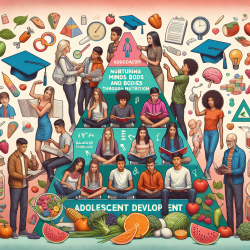Introduction
In the realm of online therapy services, ensuring cultural relevance is paramount. A recent study titled "Feasibility of a web-based suicide awareness programme for Asian American college students" highlights the importance of tailoring online mental health resources to fit the cultural needs of diverse student populations. This blog explores how practitioners can leverage these findings to enhance their online therapy services, particularly for Asian American students.
The Study at a Glance
The study conducted by Choi et al. (2016) investigated the feasibility of a web-based suicide awareness program using the video "The Truth about Suicide" among Asian American and non-Hispanic white (NHW) college students. The results indicated that Asian American students rated the video significantly lower in cultural relevance compared to their NHW counterparts. This finding underscores the necessity of considering cultural orientation when developing web-based mental health programs.
Key Findings and Implications
- Cultural Relevance: Asian American students found the video less culturally relevant, highlighting the need for content that resonates with their unique cultural experiences and values.
- Collectivist Orientation: The study found that a collectivist cultural orientation significantly predicted cultural relevance, credibility, and appeal of the video content.
- Tailored Content: Practitioners should consider incorporating culturally specific elements, such as addressing academic pressures and family expectations, which are prevalent stressors in Asian American communities.
Practical Steps for Practitioners
To enhance the effectiveness of online therapy services for diverse student populations, practitioners can take the following steps:
- Conduct Cultural Assessments: Regularly assess the cultural needs and preferences of your target audience to ensure the content is relevant and engaging.
- Develop Culturally Tailored Content: Create or adapt existing resources to reflect the cultural values, norms, and stressors specific to the student population you are serving.
- Engage with Cultural Experts: Collaborate with cultural experts or community leaders to gain insights into the cultural nuances that may impact the effectiveness of your programs.
- Utilize Feedback Mechanisms: Implement feedback systems to gather insights from students on the cultural relevance and effectiveness of your programs, allowing for continuous improvement.
Encouraging Further Research
While the study provides valuable insights, it also opens the door for further research. Future studies should explore the impact of culturally tailored web-based interventions on help-seeking behaviors among diverse student populations. Additionally, expanding the research to include other ethnic groups can provide a more comprehensive understanding of cultural influences on mental health program effectiveness.
Conclusion
Incorporating cultural relevance into online therapy services is not just a best practice; it is a necessity for creating meaningful and effective mental health support for students. By leveraging the findings from this study, practitioners can enhance their services and contribute to better mental health outcomes for diverse student populations.
To read the original research paper, please follow this link: Feasibility of a web-based suicide awareness programme for Asian American college students.










